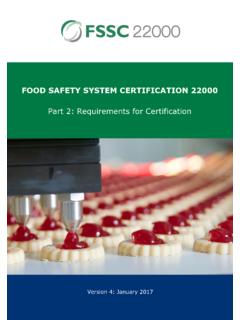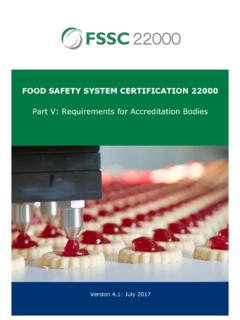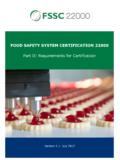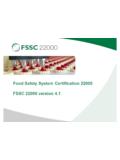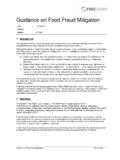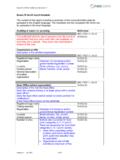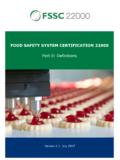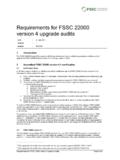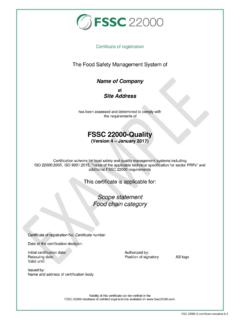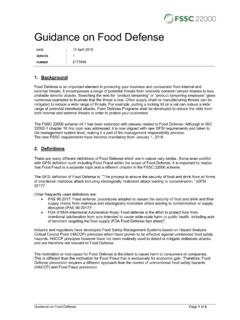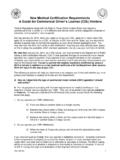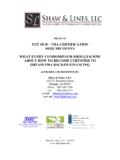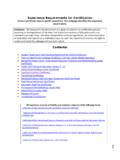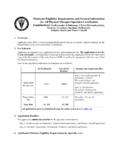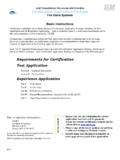Transcription of FOOD SAFETY SYSTEM CERTIFICATION 22000
1 food SAFETY SYSTEM CERTIFICATION 22000 Part III: requirements for CERTIFICATION Process Version : July 2017 Part III: requirements for CERTIFICATION Process Version July 2017 1 of 8 Part III: requirements for CERTIFICATION Process Contents 1 Purpose .. 3 2 Application process .. 3 CERTIFICATION body selection .. 3 Self-assessment .. 3 Application form .. 3 CERTIFICATION contract .. 4 Annual fee .. 4 3 CERTIFICATION process .. 4 Preparation .. 4 Two stage audit process .. 4 Certificate issue .. 4 Surveillance audits .. 4 Recertification .. 5 Logo use .. 5 4 Transition to FSSC 22000 .. 5 5 Transition to FSSC 22000 -Quality .. 5 6 FSSC 22000 -Quality CERTIFICATION .. 6 7 Significant changes .. 6 Notification .. 6 CB review .. 7 8 Serious events .. 7 Reporting .. 7 Public recalls .. 7 Immediate action.
2 7 Consequences .. 7 9 Transition period .. 8 Part III: requirements for CERTIFICATION Process Version July 2017 2 of 8 Copyright 2017, Foundation FSSC 22000 All rights reserved. No part of this publication may be reproduced and/or published in any form, by means of printed matters, photocopy, microfilm, recording or any other method or technology, without written approval by the Foundation FSSC 22000 . Foundation FSSC 22000 Box 693 4200 AR Gorinchem, The Netherlands Phone +31 183 645028 Website: Email: Part III: requirements for CERTIFICATION Process Version July 2017 3 of 8 1 Purpose This document states the CERTIFICATION process requirements relevant to an organization applying for or maintaining CERTIFICATION to be included in the FSSC 22000 Register of Certified Organizations and build on the requirements of ISO/IEC 17021-1 outlining the process requirements for audit and CERTIFICATION of management systems.
3 2 Application process CERTIFICATION body selection To receive a valid certificate, the applicant organization shall select a CB that is licensed by the Foundation. The list containing FSSC 22000 -licensed CBs is available on Self-assessment 1) It is recommended that the applicant organization conducts a self-assessment against the current version of the Scheme. The relevant ISO standards can be obtained from the ISO Store while the FSSC Additional requirements are included in Part II and can be downloaded from the FSSC website. 2) Once the self-assessment has been completed, and potential gaps are addressed, the applicant organization should contact their selected CB in order to receive an application form and afterwards agree on a CERTIFICATION contract. Application form 1) The CB will require completion of an official application form, signed by an authorized representative of the applicant organization.
4 2) It is the responsibility of the applicant organization to ensure that adequate and accurate information is shared with the CB about the details of the applicant organization. 3) The details shall include at least the following: a) The proposed CERTIFICATION scope b) The number of full-time equivalent (FTE) employees c) Details of shifts d) Number of HACCP studies e) Details of other certified management systems (such as Dutch HACCP, ISO 22000 or ISO 9001) or GFSI recognized CERTIFICATION schemes f) When applicable: information regarding organizations with off-site storage, separate head office and off-site activities (see Annex II of Part IV) g) When applicable: details related to a request for a transfer audit from the CB currently awarding the CERTIFICATION h) When applicable: details related to a request for a transition audit from Dutch HACCP, ISO 22000 or a GFSI recognized CERTIFICATION scheme to FSSC 22000 or FSSC-Quality.
5 Part III: requirements for CERTIFICATION Process Version July 2017 4 of 8 CERTIFICATION contract A CERTIFICATION contract shall exist between the organization and the CB, detailing the scope of the certificate and referring to all relevant Scheme requirements . Annual fee 1) The CB shall charge organizations certified against the Scheme an annual fee payable to the Foundation. 2) The Foundation shall decide annually on the fee amount. 3 CERTIFICATION process Preparation 1) For the initial CERTIFICATION audit, the applicant organization shall agree mutually convenient date(s) with due consideration given to the preparatory work by the applicant organization required to meet the requirements of the Scheme. 2) The organization must prepare carefully for the audit, to have appropriate documentation for the auditor to assess and to have appropriate staff available at all times during the on-site audit.
6 3) The organization shall ensure that the relevant products and/or services and related processes for the scope of CERTIFICATION are in place and can be assessed during the audit. Two stage audit process 1) The initial auditing for CERTIFICATION is always carried out at the production site of the applicant organization and is conducted in two separate stages: a) The Stage 1 audit, verifies that the SYSTEM has been designed and developed in accordance with the organization s top management commitment to conform with Scheme requirements . The objective of this audit is to assess the preparedness of the applicant organization to proceed to the stage 2 audit. b) The Stage 2 audit substantiates top management s claim by auditing implementation of the food SAFETY management SYSTEM . 2) The activities subject to the proposed CERTIFICATION scopes shall be assessed during the initial CERTIFICATION audit.
7 Certificate issue The CB will issue the certificate within 30 calendar days from the date of the CERTIFICATION decision. The certificate expires three years after the date of the initial CERTIFICATION decision. However, whilst the certificate is issued to the applicant organization, it remains the property of the CB under the conditions outlined in the contract. Surveillance audits 1) Surveillance audits shall assess and report on conformity with all Scheme requirements including the use of marks and references to CERTIFICATION . 2) At least one of the two annual surveillance audits shall be unannounced. 3) The audit program shall also consider the results of any previous audits including the unannounced audit(s). Part III: requirements for CERTIFICATION Process Version July 2017 5 of 8 4) If not all audit objectives are fulfilled during an unannounced audit, an additional audit shall be performed of which the nature shall be determined by the CB.
8 Recertification 1) The recertification audit must be planned and conducted in due time to enable timely renewal of the certificate before the expiry date. 2) The purpose of this audit is to confirm the continuing conformity of the food SAFETY management SYSTEM as a whole with all Scheme requirements . 3) The recertification activity also includes a review of the food SAFETY management SYSTEM over the whole period of CERTIFICATION , including previous surveillance audit reports and complaints received. 4) The CB decides on renewal of the CERTIFICATION cycle on the basis of the recertification audit which must meet the same requirements as an initial audit. Logo use 1) The use of the FSSC 22000 logo represents achievement of CERTIFICATION against the highest management SYSTEM standard for food SAFETY . 2) To maintain its integrity, use of the logo and protection of its copyright is controlled by the Foundation FSSC 22000 .
9 3) Mentioning possession of a FSSC 22000 certificate or making any reference such as for example Produced in a FSSC 22000 certified company on a product label, packaging, etc. is not allowed. 4) Please note that the CB will audit the use of the FSSC 22000 logo by certified organizations during every initial, surveillance and recertification audit to ensure compliance with the logo use requirements described in section of Part II. Any nonconformity associated with the use of the logo will require the organization to take remedial action to restore conformity with the criteria described here. 4 Transition to FSSC 22000 1) When transitioning from Dutch HACCP, ISO 22000 or a GFSI recognized CERTIFICATION scheme to FSSC 22000 CERTIFICATION , a full stage 1 and 2 audit is not required to confirm compliance of the food SAFETY management SYSTEM with all Scheme requirements .
10 The transition audit is based on the recertification Scheme requirements . In this case, the audit report shall: a) clearly specify the audit type transition audit from Dutch HACCP, ISO 22000 or a GFSI recognized scheme to FSSC 22000 , b) provide details of the previous audit related to nonconformities, c) confirm the validity of the existing certificate, d) confirm compliance with all Scheme requirements . 2) The transition audit time calculation is based on the recertification Scheme requirements , as specified in Part IV, Annex II. 3) The transition audit shall result in a new FSSC 22000 certificate with a regular validity of three (3) years. 5 Transition to FSSC 22000 -Quality 1) When transitioning from ISO 9001 to FSSC 22000 -Quality CERTIFICATION , a full stage 1 and 2 audit is not required to confirm compliance of the food quality management Part III: requirements for CERTIFICATION Process Version July 2017 6 of 8 SYSTEM with all Scheme requirements .
